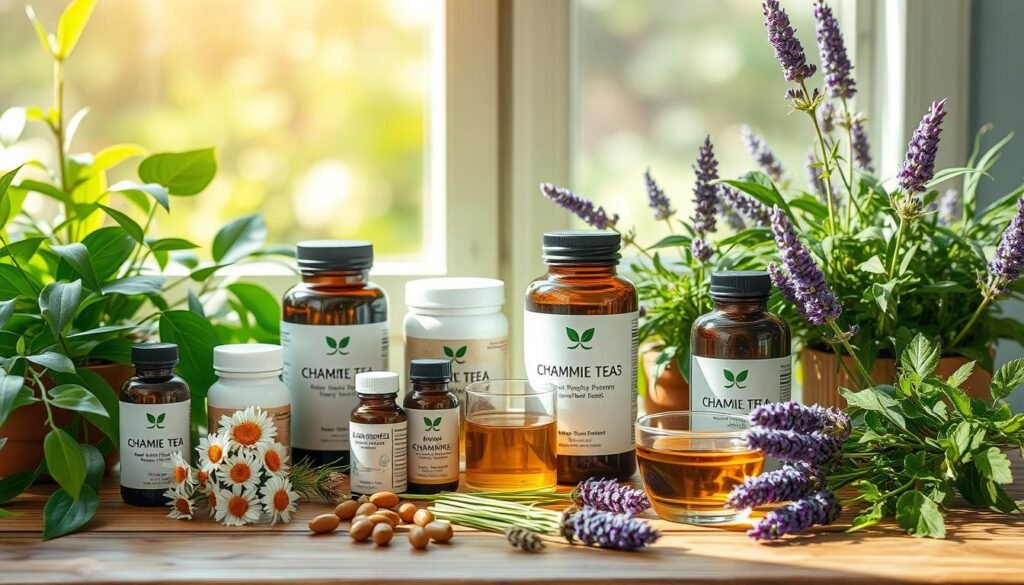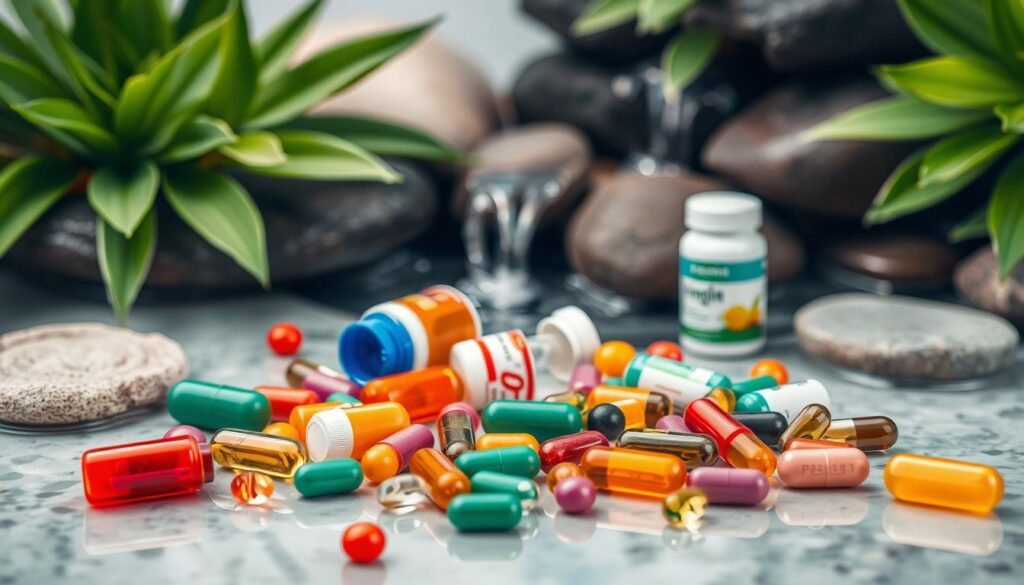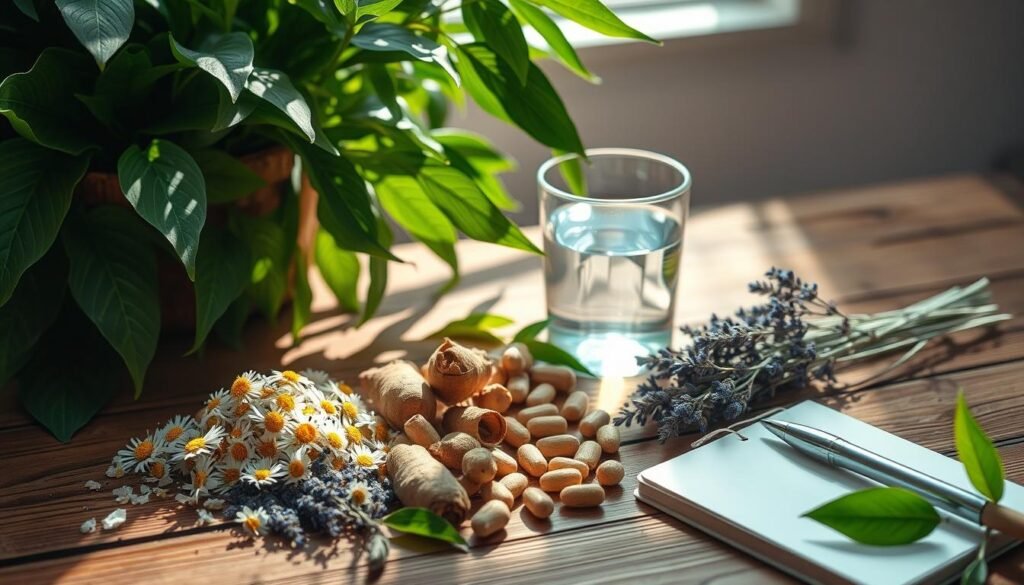Did you know that 44 percent of the U.S. adult population experiences symptoms of anxiety? That’s more than 113 million people. This big number shows how common anxiety is. Many people look for effective ways to lessen their symptoms. Natural supplements can be a good option, along with a healthy lifestyle and professional help. But remember, these supplements don’t replace traditional therapy or medical advice.
When looking for ways to manage anxiety, there are many paths to explore. Herbal remedies, vitamins, and minerals can be helpful. This article focuses on options backed by science. They could improve your mental health and help with anxiety relief.
Key Takeaways
- Anxiety affects approximately 44% of U.S. adults, making it the most common mental illness.
- Natural supplements can support anxiety management but should not replace professional treatment.
- Vitamins and minerals like magnesium and vitamin D are essential for reducing anxiety symptoms.
- Specific herbal remedies, such as ashwagandha and chamomile, show promise in alleviating anxiety.
- It’s important to consult healthcare professionals before starting any new supplements.
Understanding Anxiety and Its Impact
Anxiety is complex, showing up differently in everyone. It includes many conditions marked by intense fear and worry. These often disrupt emotions and daily tasks. Anxiety’s types, like generalized anxiety disorder and panic disorder, vary in symptoms.
Understanding anxiety means spotting its signs, both mental and physical. You might notice things like racing thoughts or trouble sleeping. Researchers have found that lifestyle can affect anxiety. For example, not having enough magnesium could make anxiety worse. Eating foods rich in magnesium might help manage it.
Not getting enough certain vitamins can also raise anxiety levels. Studies show that not having enough vitamin D can increase anxiety. They also show how important B vitamins are for emotional stability. Taking in these vitamins from food or supplements can greatly affect your mood. Omega-3s might also help lower anxiety and improve how you feel.
Dealing with anxiety should include looking at all parts of your life. Talk to a doctor before you try new supplements. This is very important with supplements like melatonin, as they work differently for everyone. For more information on supplements that could help with anxiety, check out this resource.
| Vitamin | Impact on Anxiety | Sources |
|---|---|---|
| Magnesium | May reduce anxiety levels | Leafy greens, nuts, whole grains |
| Vitamin D | Low levels correlated with increased anxiety | Sun exposure, fatty fish, fortified foods |
| B Vitamins | Deficiency linked to anxiety and depression | Whole grains, meat, eggs, legumes |
The Role of Supplements in Anxiety Management
Millions of Americans struggle with anxiety. This creates a big health challenge. Over 6.8 million suffer from generalized anxiety disorder. Plus, 55 million deal with both anxiety and depression. Today, there’s a big push to find effective ways to treat these issues. While meds and talking to a therapist help, many people also look at supplements for anxiety management. They see them as another way to feel better.
Studies show that some natural anxiety aids can really help. A big review of 24 studies, with 2,619 people, found that 71% of these studies saw good results with supplements. This news suggests that alternative treatments for anxiety have a place in dealing with anxiety.
These studies looked at various supplements. For example, passionflower was checked out in 278 people. Kava was tested in 1,054 people. Most of the folks in these studies were women. It’s important to understand that these natural options are helpful. But, they’re part of a bigger plan to tackle anxiety, not the only option.
Before trying these supplements, talking to a doctor is key. Mixing what doctors know works with the possible help from natural anxiety aids might lead to better results. This way, people with anxiety might find more ways to manage their condition.
Natural Supplements for Anxiety Relief
Natural supplements are a promising choice for those looking to ease anxiety. They support mental well-being. They do this without just looking at the root causes. Adding supplements that boost mood to your daily routine could make you feel more stable and less down.
Magnesium is a popular supplement for anxiety relief. A systematic review showed that it can help lessen anxiety symptoms. B vitamins, especially B12, are also good for lowering anxiety and depression. Eating foods high in these vitamins can improve your mood even more.
Omega-3 supplements, like fish oil, are known for their potential to manage anxiety. They can help you become more emotionally resilient. L-theanine, from green tea, is great for reducing stress response, making it a good choice for finding calm.
Herbal solutions include valerian root and chamomile extract. Valerian root can help lower anxiety if used for short times. Chamomile has proven effective for generalized anxiety disorder symptoms.
Choosing high-quality supplements and the right dosage is vital for safety. It’s important to go for trusted brands. Always talk to healthcare experts before starting any supplement plan, so it fits your individual needs.
Supplements to Help with Anxiety
Many people now look for supplements to help with anxiety. They explore anxiety-reducing nutrients and herbal options. Ashwagandha is a top choice due to its adaptogenic qualities. It is said that taking 150-300 mg daily can ease anxiety symptoms.
Valerian root has been a go-to for its calming effects for ages. Its success in easing anxiety varies among users, with 300-600 mg suggested before sleep. However, its results can differ from one individual to another.
Magnesium glycinate plays a key role in mood regulation and might aid in handling anxiety. For kids, starting with 50-100 mg a day and adjusting is common. More information on supplements can be found in this link.
Inositol could be vital, especially for those with panic attacks. Taking 12-18 grams a day may mirror the effects of some medications. It’s seen as a strong natural choice. Yet, caution is needed as the efficacy of supplements can vary.
Omega-3 fatty acids, like those in fish oil, are also chosen by many. Dosages for kids often range from 500-1,000 mg of EPA and DHA a day. These fats can boost mood by fighting inflammation, offering a more rounded treatment method.

Talking to a healthcare provider before starting any supplement is crucial. With herbal supplements for anxiety becoming more known, it’s important to know their pros and cons. This knowledge can help in making wise choices.
Herbal Remedies for Anxiety
Exploring herbal remedies for anxiety offers insights into effective, natural ways to manage symptoms. Each remedy brings its own benefits and possible risks. Knowing these can help anyone looking into herbal solutions.
Kava: Benefits and Risks
Kava has gained attention for its ability to reduce stress and increase relaxation. Many users feel more at ease after using it. However, using kava requires caution due to reported severe liver damage. Always consult a healthcare provider before trying it.
Passion Flower: Efficacy and Usage
Passion flower is noted for aiding anxiety symptoms. It’s particularly the species P. incarnata that may lessen restlessness and nervousness. Though research shows it has potential, be aware of its sedative effects, especially when used with other medications.
Valerian Root: Short-term Use and Effects
Valerian root is often mentioned for its calming effects among herbal remedies for anxiety. While it has shown benefits, research on its effectiveness offers mixed findings. It’s usually suggested for short-term use to see how well it works without long-term risks.
Vitamins and Minerals that Alleviate Anxiety
Anxiety affects daily life gravely. Thus, it’s key to look for various relief methods. Some vitamins and minerals are crucial in managing anxiety symptoms. Learning about these important nutrients, their sources, and effects is helpful. It shows us how natural therapies can ease anxiety.
Magnesium: Importance and Sources
Magnesium is essential in dealing with anxiety. It’s involved in over 300 body reactions, greatly affecting the nervous system. Not having enough can make stress worse and increase anxiety. Foods rich in magnesium include:
- Leafy greens such as spinach
- Nuts and seeds
- Whole grains
- Legumes
Using magnesium supplements has shown promise in easing anxiety. It helps stabilize one’s mood.
Vitamin D: Connection with Mental Health
Vitamin D has become notable for its mood-regulating importance. It helps fend off anxiety. Studies show that low levels of vitamin D link to more anxiety symptoms. You can get this vitamin from the sun and food like:
- Fatty fish like salmon
- Eggs
- Fortified foods
Raising your intake of vitamin D could better mental health. This is especially true for those prone to anxiety.
Omega-3 Fatty Acids: Benefits for Anxiety
Omega-3 is good for more than just physical health. These fats help lower anxiety symptoms. Their anti-inflammatory effects also aid in controlling anxiety’s emotional parts. You can find omega-3s in:
- Fatty fish such as mackerel and sardines
- Chia seeds
- Flaxseeds
- Walnuts
Adding omega-3s to your diet can enhance mood and reduce stress. They are great for fighting anxiety.

| Nutrient | Benefits | Food Sources |
|---|---|---|
| Magnesium | Helps reduce anxiety and stabilize mood | Spinach, nuts, seeds, whole grains |
| Vitamin D | Regulates mood and may prevent anxiety | Salmon, eggs, fortified foods |
| Omega-3 Fatty Acids | Reduces anxiety symptoms and supports emotional health | Mackerel, chia seeds, walnuts |
Calming Supplements to Consider
There are many calming supplements that help with anxiety. L-theanine and chamomile are top choices due to their benefits. This section looks at how these supplements help and how to add them to your daily life to improve mental health.
L-Theanine: How It Works
L-theanine is an amino acid found mostly in green tea, known for its calming effects. This supplement helps you relax without feeling sleepy, which is great for daytime. It boosts alpha brain waves, making you feel peaceful while also keeping you focused. Adults usually take 100 mg to 400 mg a day, and children take less, from 50 mg to 200 mg. Users often feel better mood and less anxiety after regularly taking L-theanine.
Chamomile: Its Calming Properties
Chamomile is a traditional herbal remedy celebrated for its calming effects. Often consumed in teas and supplements, it helps calm the mind and promote sleep. Studies confirm chamomile helps lessen anxiety, especially if used over time. Its compounds, like apigenin, work with the brain to ease anxiety and encourage calmness. Adding chamomile tea or supplements is a great way to help with calming.
| Supplement | Active Ingredient | Benefits | Recommended Dosage |
|---|---|---|---|
| L-Theanine | Amino Acid | Promotes relaxation, improves focus | 100-400 mg daily (50-200 mg for children) |
| Chamomile | Apigenin | Reduces anxiety, aids in sleep | 400-1600 mg daily |
Adding these supplements to your wellness plan is a good strategy for anxiety management. For personalized advice and correct use, talk to a healthcare expert.
Safety and Effectiveness of Natural Supplements
It’s key to know how safe and effective natural supplements are if you’re thinking about using them for anxiety. The main issue is the lack of strict rules. This makes it hard to trust the products out there. It’s smart to check the quality of supplements before you use them. This ensures they are safe.
Quality Testing and Regulations
In the U.S., natural supplements aren’t as strictly checked by the FDA as drugs are. This makes finding safe products a challenge. Quality testing varies a lot between makers, which can be risky. Even though many supplements are safe and don’t have bad side effects, not all are effective. It’s best to choose supplements that have been through thorough testing and follow strict guidelines.
Consultation with Healthcare Professionals
Before starting supplements, talk to a healthcare expert. They can help you avoid bad mixtures with other medicines and make sure the supplements suit your health needs. Even if a supplement like kava can help with anxiety, its mix with other medications can differ. Talking to a healthcare provider gives you the info to choose wisely. For more on how supplements can help with anxiety, check out this article.

Long-term Use of Natural Supplements
Using natural supplements for a long time can help those with anxiety. However, it’s key to know the risks. People should talk to doctors to understand the side effects and how well supplements work.
Understanding Potential Side Effects
Natural supplements can aid mental health, yet they might cause side effects. Some can make anxiety worse by affecting the nervous system. Watching how they work and noting bad reactions is crucial, especially with herbs like St. John’s Wort that affect medications.
Monitoring Effectiveness Over Time
It’s important to keep checking if supplements help over time. Using a journal or chatting with doctors can track anxiety changes. Checkups help see if you need to change your supplement dose or type for better health.
Adding stress management practices can make supplements more effective for anxiety. Tips from resources like this offer ways to boost mental wellness. By being aware and active, people using supplements can aim for less anxiety and a better life.
Conclusion
The journey to handle anxiety involves many strategies. An increasing number of people are looking into natural supplements as part of their treatment plans. This article shows how certain herbal supplements, for example, passionflower and kava, help lessen anxiety symptoms.
Minerals like magnesium are also crucial but often overlooked. Given that around 6.8 million Americans are affected by generalized anxiety disorder, these findings are very timely.
The proof supporting natural supplements for anxiety is strong. Every randomized controlled trial reviewed showed a good effect. Yet, it’s key for people to use these options wisely and make informed choices. Mixing these supplements with standard therapies and lifestyle changes could result in the best outcomes.
It could help those dealing with anxiety lead more balanced lives.
Taking natural steps under professional advice can boost individuals’ efforts in achieving mental health. Safe use of these options, confirmed by talking with healthcare providers, can majorly improve one’s journey to manage anxiety.
Including remedies like magnesium or herbal extracts gradually can be beneficial. These steps can make life better. For those curious, more information on supplements in treatment is available here.